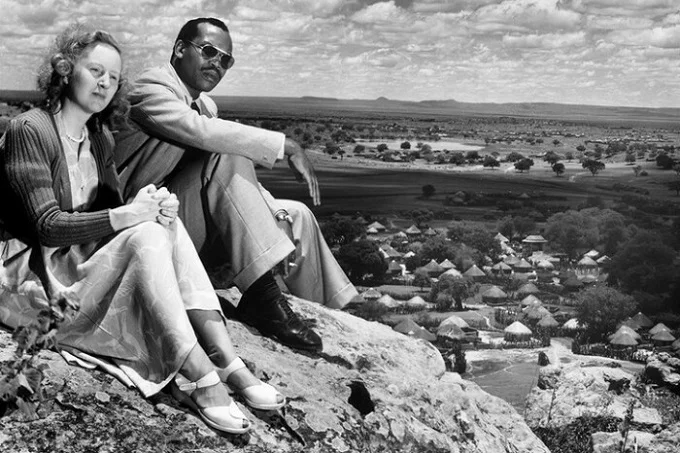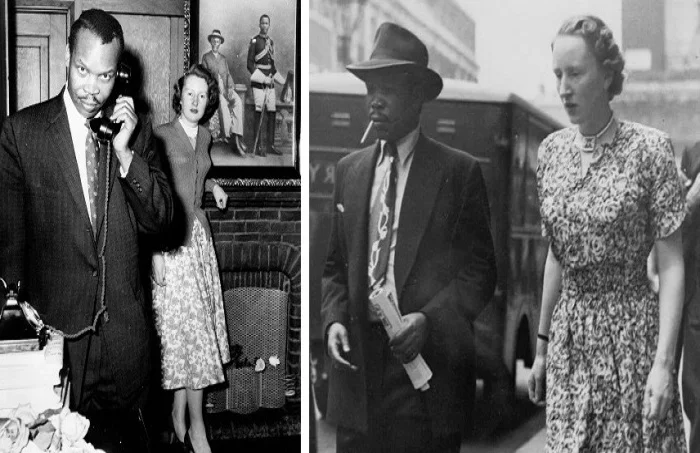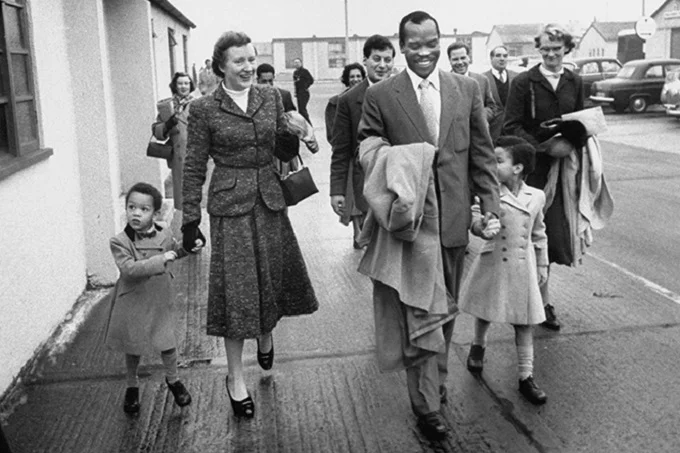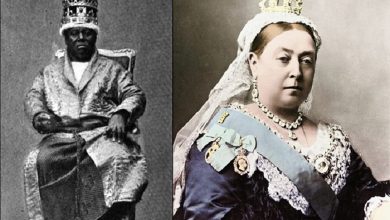Seretse and Ruth: Black and White love that changed Africa

The twentieth century is rife with legendary love tales that often affected the course of global history. The marriage of Botswana’s first president, Sir Seretse Khama, and the Englishwoman Ruth Williams is one of them.
In 1948, the audacious pair of races caused considerable political and international upheaval. Everyone was hostile to their love, yet it altered a whole nation on the Black Continent.
Nothing hinted at danger
Seretse Khama was born in the year 1921. He was the son of Bechuanaland’s King Sekgoma Khama II and Queen Tebogo. His pope did not reign over the kingdom, which was under British dominion at the time, for long; he was only on the throne for two years. When the king died, his son Seretse was instantly named as the next monarch, but the kid was only four years old, thus there was no way around it without a regent. Tshekedi Khama, the late king’s brother, was named regent.
He immediately developed a thirst for power, and Seretse was sent to study far away in Europe so that his growing nephew wouldn’t interfere with his controlling the state the way he desired. Tshekedi assumed that the youngster would soon forget that he was to succeed the kingdom, but he was mistaken, for he had no idea that his nephew would encounter true love in London.
Ruth Williams was born in 1923 in South London to an officer, George Williams. He had two daughters, Ruth and Muriel, with his wife, Dorothy.
Ruth’s schooling at Eltham Grammar School was disrupted by World War II, and she worked as an ambulance driver in southern England. When peace returned to Europe, she started working as a secretary typist at Lloyd’s Bank’s insurance office. Her life was routine, but she was about to have an essential meeting that would flip everything upside down.
The moment when everything changed
In England, the future king of a little-known African kingdom and the daughter of a retired British soldier met. Muriel Williams-Sanderson, Ruth’s sister, volunteered to accompany her to a dance celebration for military families hosted by the London Missionary Society. An Oxford University student and part-time Crown Prince of Bechuanaland also attended the same event.
Seretse Khama was not a heedless wealthy prince; he was well-educated, had progressive ideas on society at the time, and envisaged an alternative route for his state’s growth. He desired for his nation to be free of the British protectorate and to have the opportunity to flourish politically and economically.
As is frequently the case, a single incident alters a man’s fate, and in this instance, it was a dance. Even though the world was full of discrimination at the time, a dark-skinned guy chose to invite a white Englishwoman to dance.
From the first chords, the girl agreed, and a true loving connection blossomed between them. It was love at first sight for them, and they immediately realized they didn’t want to be apart. After a year of dating, they concluded they wanted to be husband and wife. Of course, conservative families objected.
Against all odds weddings
Marriages between whites and blacks were not tolerated in society at the time. The girl’s father said unequivocally that he would not marry his beloved daughter to a dark-skinned male, no matter how wealthy or even heir to the kingdom he was. He pushed Ruth out of the home, disowned her, and could not accept her decision till the rest of his days. Ruth was also denied access to it once the employer discovered everything.
Seretse’s uncle also spoke out against it, insisting that he complete his studies first and marry whoever the family selects when he returns home. The lovers’ family had no clue what this marriage would imply for the United Kingdom and the whole African continent at the time.
Both families’ protestations did not deter them, and they resolved to marry by whatever means necessary. However, the priest who intended to marry them was informed explicitly that a wedding between a black bride and a white bride was not permitted.
Seretse Khama decided to seek assistance from his uncle, but he said that he would never accept a white girl as his wife and was prepared to fight him. Despite this, Ruth and Seretse chose to marry and become husband and wife. So they proceeded to the registrar’s office, where they previously got their union legalized. But it was only the beginning of their problems.
Going back to Africa
Tshekedi, Seretse’s uncle, asked that his nephew and Ruth travel to Bechuanaland. But he didn’t want to visit them to congratulate them; he wanted to have the marriage annulled. But his plan failed because he was dealing with the king, not an impostor like Tshekedi. The tribe convened a public assembly, and the majority sided with Seretse.
It may have ended happily, yet the turbulence was not in vain. The issue piqued the attention of South Africa’s ruling racist party. The United Kingdom was pressed, prompting an investigation into whether Seretse was fit to rule the protectorate.

According to the findings of the inquiry, Seretse was found to be fit, but the report was hidden. Seretse and Ruth were instructed to return to London till things improved, kind of like an exile. Britain gave up to South African pressure because it had an economic stake in the country’s inexpensive uranium and gold.
In Ruth’s home England, the couple had challenges. They were unable to return home, and they were unable to employ the girl. They found themselves in a bind since there was no place for them in the United Kingdom, and they were definitely not wanted in Africa.
The wind of change
Who knows what might have happened if this event had occurred a few decades earlier. Seretse’s uncle was already rejoicing in triumph, but the world was moving too quickly for him. Protests against British racism were sweeping the country. In Bechuanaland, the people opted not to follow in order to succeed King Seretse Khama.
When a period, Seretse and his wife opted to return to Bechuanaland after he abdicated the monarchy in 1956. They even attempted to live a normal life at first, intending to herd cattle on a ranch. However, their plan failed due to a lack of expertise in the industry. The former king then decided it was time to return to politics.
A fresh start
Seretse started his comeback to politics by being elected to the tribal council at the bottom. In 1961, he established the Bechuanaland Democratic Party. Many people were willing to follow such a leader, and his past of exile surely helped him.
He won the election in 1965 and launched the effort to leave the British protectorate. His purpose was accomplished, and the newly constituted state of Botswana obtained independence in 1966. He ascended to the throne of the nation. Later, Queen Elizabeth II bestowed the Order of the British Empire on him.
Seretse’s motherland was in shambles, one of the world’s three poorest powers. No civilization was out of the question, since the nation lacked paved roads and infrastructure, and the majority of the population was illiterate. Seretse made the decision to act.
Seretse might be considered to have built a state from the ground up. He unveiled a new economic plan centered on diamond and copper mining. Seretse attacked corruption, altered tax policy, issued a new currency, and proclaimed individual liberty.
He promoted tourism, the army, health care, education, and did all he could to bring foreign investment into the nation. Botswana’s economy grew swiftly as a result of his astute strategy; this is why his rule was subsequently dubbed the “golden era” of Botswana.
A dependable rear
Ruth, his loving woman, his dependable companion, and closest friend, was constantly with Seretse. She was involved in the state’s political life, was quite influential, and elicited nothing but admiration.
Seretse not only adored but also had high regard for his wife. Although Ruth spent most of her life away from her home England, she never forgot her origins and remained true to tradition. She dressed in traditional English fashion, favoring elegant skirts and blouses. Sundays in their home were not complete without the obligatory tea gathering.
Ruth and Seretse had four children from their marriage: Jacqueline, Jan, and twins Anthony and Tshekedi. The elder son followed in his father’s footsteps and became president, while his younger brother Tshekedi also rose to prominence in Botswana politics.

Seretse passed away from cancer in 1980. Ruth continued to reside in Botswana after her husband died, and it was only then that she received respect from her fellow countrymen. Ruth outlived her husband for many years, dying in 2002 at the age of 78.
The film “The United Kingdom,” which tells the love tale of Seretse and Ruth and their journey in love and politics, was released in 2016. Rosamund Pike and David Oyelowo performed the lead parts.




